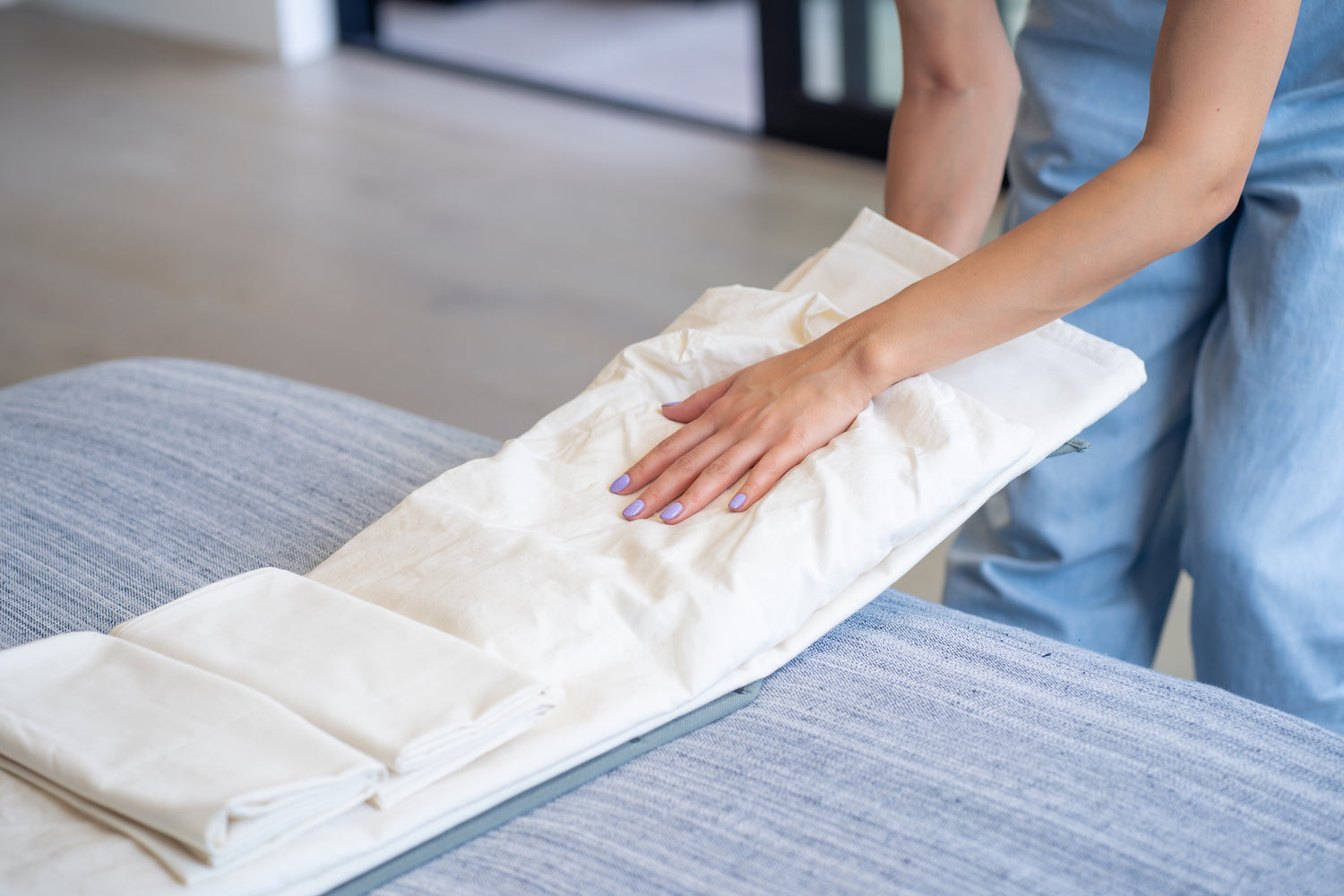Your bed is one of the most crucial spaces in your home whether you make your bed every morning or tend to leave your sheets in a pile on the floor. After all, most of us spend about eight hours a day there. A comfortable, high-quality mattress is the key, however silk pillowcases, soft sheets and a cozy duvet are important, as well. It is not a secret that those bed sheets and pillowcases need to be washed, and there are a lot of differing opinions on how to wash them. It is important to note that regular care and maintenance of your bed can help to ensure that it lasts for many years, and that you get the best possible sleep. It is essential to make sure that you are taking the time to care for your bed properly, so that you can enjoy a comfortable and restful night's sleep, every night. Here’s what you need to know to care for your bed:
Make your bed every morning.
Not only does it make your room look neater, it also helps to keep your bedding fresh and clean.
Rotate and flip your mattress regularly.
This will help to prevent sagging by distributing wear and tear evenly. Additionally, rotating and flipping your mattress can help to reduce the formation of body impressions, which can cause discomfort and affect the support provided by the mattress. It's generally recommended to rotate your mattress every three to six months and flip it every six months.
Use a mattress protector.
A mattress protector can help to extend the life of your mattress by protecting it from spills, stains, and wear and tear. It can also provide an extra layer of comfort and protect against allergens such as dust mites, pet dander, and pollen. Additionally, it can be easily removed and washed for easy cleaning.
Store correctly.
Store your bed sheets, duvets and pillowcases in the LinenMate bedding organizer to protect your beddings from dirt and dust and keep them in great shape. It will help you stay organized by keeping your bedding all in one place, easy to reach, folded, labeled and stored neatly in a breathable organizer.
Use high-quality bedding.
Invest in good quality sheets, pillowcases, and comforters. Bedding materials such as cotton or bamboo are soft, breathable and comfortable, this can help to promote a better night's sleep. They are often more durable than lower quality materials, which means that it will last longer and require less frequent replacement. Besides, high quality bedding is often more aesthetically pleasing and can add a touch of luxury and elegance to your bedroom. And finally, high-quality bedding also tends to be made of more sustainable materials, which can be better for people who suffer from allergies or asthma as it could be hypoallergenic.
Vacuum your mattress.
Use the upholstery attachment on your vacuum cleaner to remove dirt, and allergens from your mattress. This can help to remove dust mites, which are tiny insects that can cause allergies and asthma symptoms in some people. Additionally, vacuuming can help to remove pet hair and dander, which can also cause allergies.
Use a pillow protector and replace your pillows every 2 years.
Pillow protectors will help to keep your pillows fresh and clean, and prolong their life. Pillows lose their shape and support over time, and need to be replaced to ensure a good night's sleep.
Use a duvet cover.
A duvet cover will protect your duvet and keep it clean, and it's easy to change the look of your bed by simply changing the cover. They provide an extra layer of protection for the duvet itself. Besides, they serve as a barrier against dust, dirt and allergens, making it easier to maintain the hygiene of the bedding.
In addition to the above tips, it is also recommended to use a bed frame and a box spring, as they provide a sturdy foundation for your mattress, and help to keep it in good shape. Box spring and bed frames also provide additional storage space, which can be useful for storing extra bedding or clothing. By following these tips, you can ensure that your bed is always fresh, clean, and comfortable.
How often should you wash your sheets?
Most experts recommend a weekly wash as bed sheets are an essential part of our daily lives, and keeping them clean and fresh is crucial for a good night's sleep. However, many people do not know the proper way to wash and care for their bed sheets, which can lead to wrinkled, dingy-looking sheets. Here are some tips and tricks on how to wash bed sheets for crisp, wrinkle-free results, including how to wash different types of sheets like silk, linen and bamboo sheets. We will also tell you how to store clean sheets.
How to Wash Sheets
The first step in washing your sheets is to read the care label on the sheet. The label will tell you the recommended water temperature and any special instructions for washing. In general, sheets should be washed in warm water on a gentle cycle with a mild detergent. Avoid using bleach or fabric softeners, as these can damage the fibers and shorten the life of your sheets.
How to Wash Silk, Linen and Bamboo Sheets
Silk sheets are delicate and require special care. Always hand wash or dry clean silk sheets, and avoid using bleach or harsh detergents. Use a mild detergent specifically designed for silk and cool water. Linen sheets can be washed in the washing machine on a gentle cycle with warm water and a mild detergent. Bamboo sheets are generally very easy to care for. They can be washed in the washing machine on a gentle cycle with warm water and a mild detergent. Press out excess water gently and hang dry in the shade. Avoid exposing sheets to direct sunlight.
How to Store Clean Sheets
When storing clean sheets, be sure to keep them in a cool, dry place, out of direct sunlight. Fold or roll the sheets rather than hanging them, which can cause stretching and damage to the fabric. Always store sheets in a breathable LinenMate bedding organizer to protect them from dust and other debris.
To conclude, properly washing and caring for your bed sheets is essential for keeping them looking crisp and wrinkle-free. By following the tips and tricks outlined in this article, you can ensure that your sheets are always fresh and clean. Remember to always read the care label on your sheets and pay attention to the specific care instructions for different types of sheets like silk, linen, and bamboo. Also, be aware of when to wash sheets and how to store them properly for a longer life. With a little bit of effort, you can enjoy crisp, wrinkle-free sheets every night.





